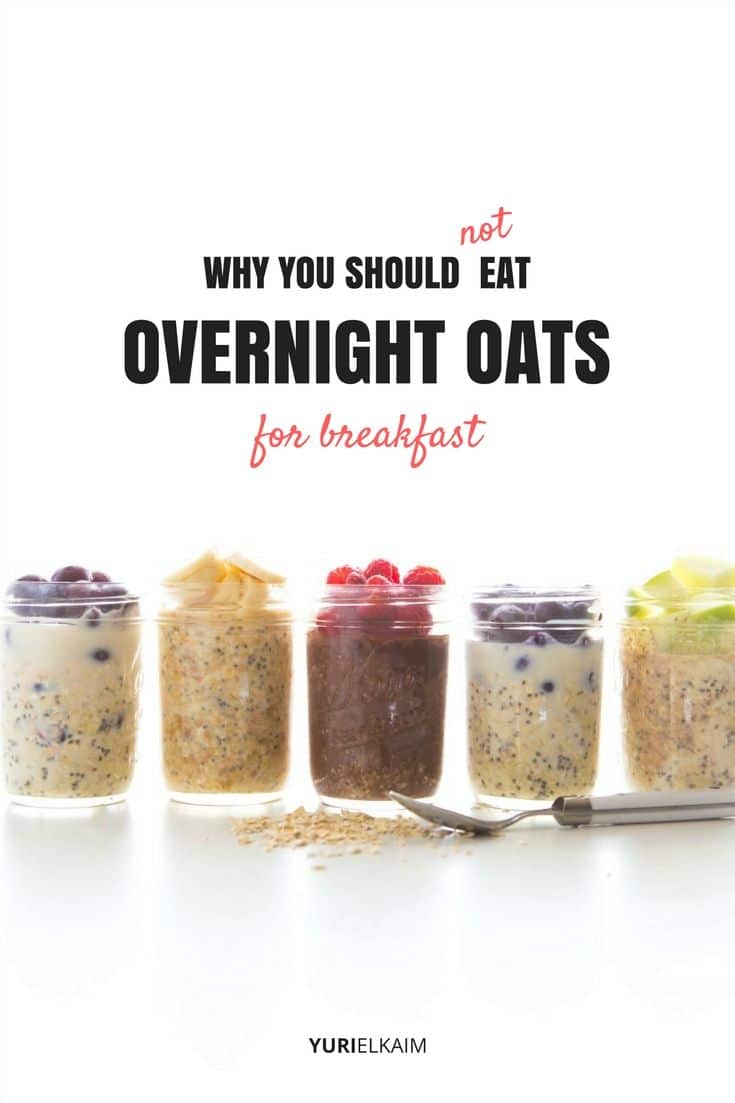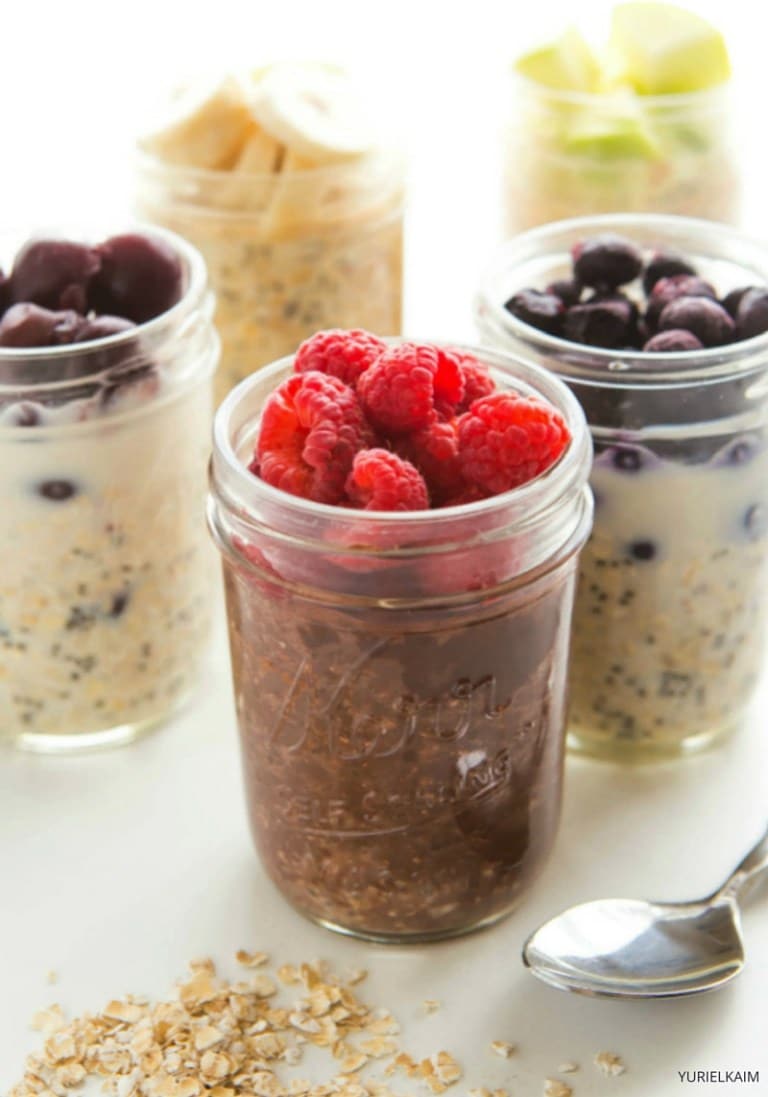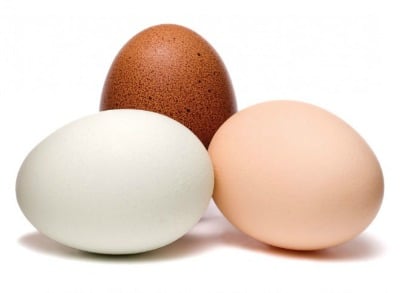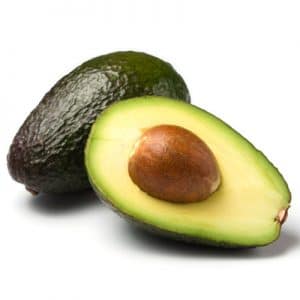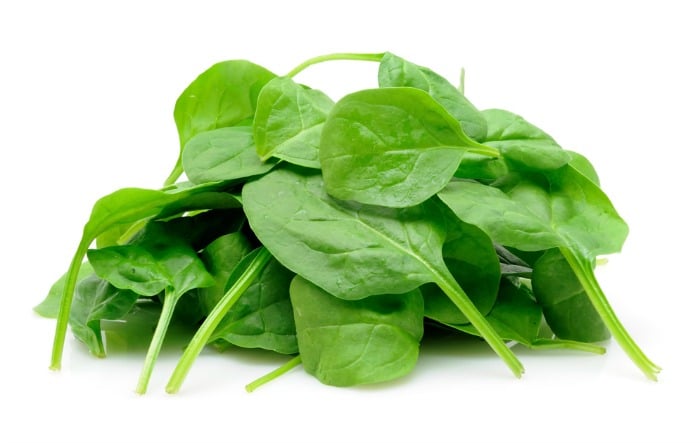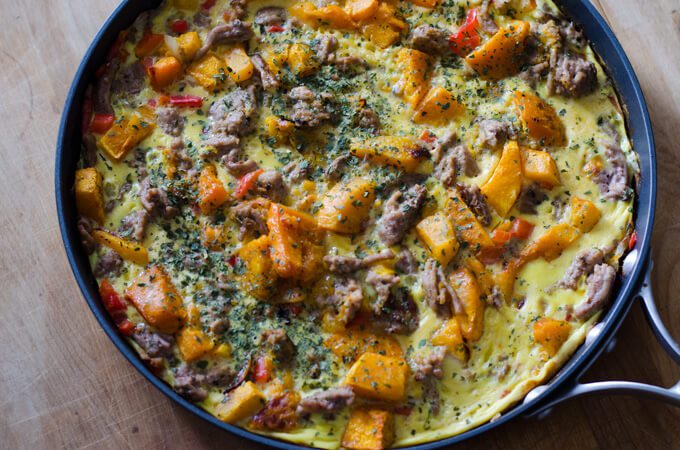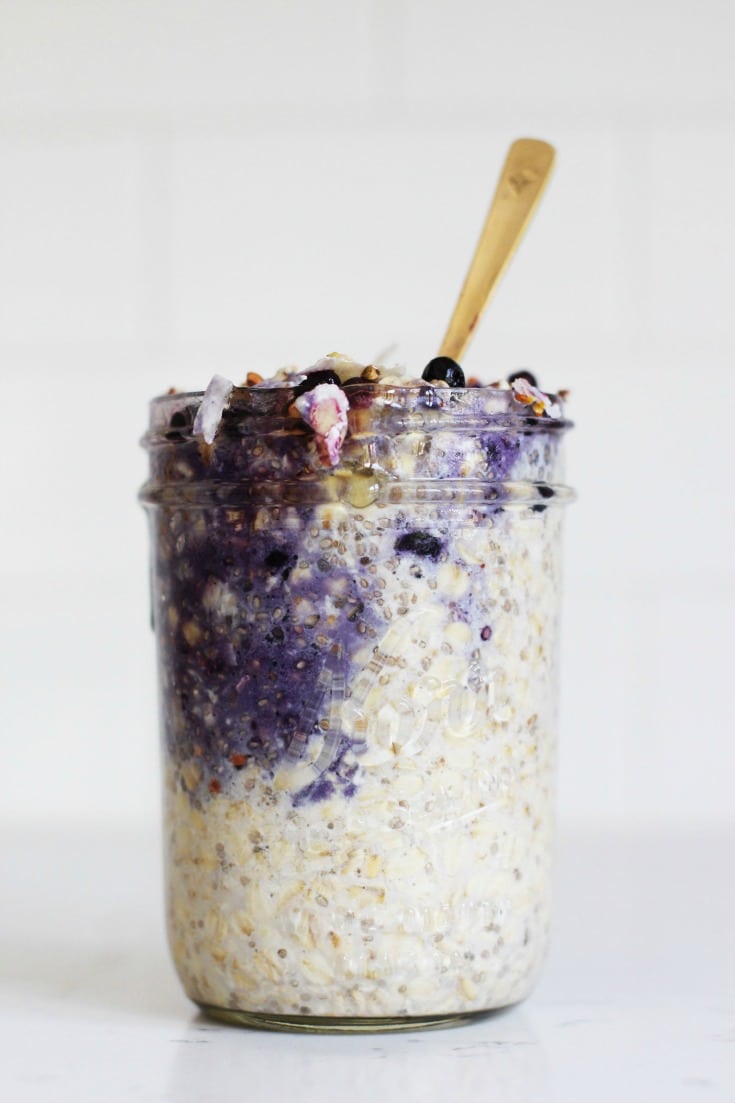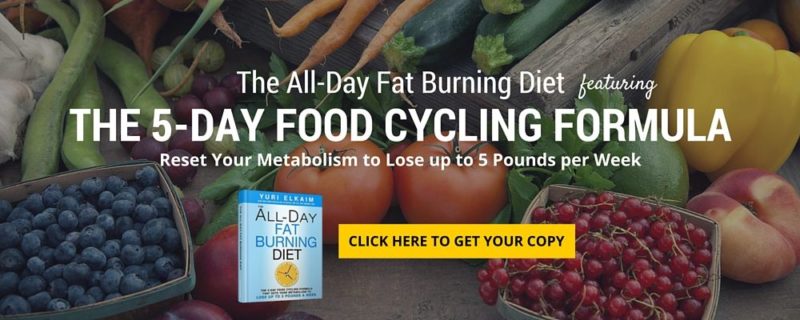In this article
Scroll through any food blog or nutrition website and you’ll probably notice a few mentions of overnight oats, the breakfast craze that’s been sweeping the nation.
It sounds like an ideal breakfast solution: you do everything the night before and wake up with breakfast waiting for you right in the fridge.
No need to set the alarm early and no effort required on your part.
Don’t get me wrong, I’m a big fan of overnight oats. Overnight oats can also be nutritious, especially since oats have been associated with a multitude of health benefits.
Overnight oats first thing in the morning, though?
Not such a great choice.
What are Overnight Oats?
Overnight oats are a great solution for a quick and easy meal or snack. Similar to oatmeal, overnight oats are oats that are soaked overnight and absorb the liquid.
They can be soaked in any type of yogurt or milk, but I recommend coconut milk or almond milk as my personal favorites.
Overnight oats are a popular breakfast choice because you can assemble the ingredients, refrigerate, and have breakfast ready to go when you wake up without having to get up any earlier to cook.
Fruit, nuts, and seeds are common add-ins when it comes to overnight oats, and they’ve risen to widespread popularity because of their versatility and ease in preparation.
There really are endless combinations and possibilities for customization.
But here’s the problem with overnight oats: they’re high in carbohydrates, making them a less-than-ideal choice when it comes to breakfast.
Instead of loading up on carbs first thing in the morning, I recommend saving those overnight oats for later in the day or after your workout.
Why Avoid Overnight Oats in the Morning?
Carb-laden breakfasts are never a good idea.
When we eat carbohydrates, they are broken down into glucose in the bloodstream. This triggers the release of insulin, which is responsible for delivering that glucose to the muscle cells for storage or the liver to be used up as energy.
The problem is that the liver and the muscle stores have a cap on the amount of glucose they can hold. When we eat a carb-heavy meal, any of the glucose that’s left over is stored as fat … and no one wants that.
Cortisol levels are also highest in the morning, which helps keep us alert and focused throughout the day. Too many carbohydrates can dull the cortisol response, leaving us feeling groggy and tired.
Because cortisol is also closely tied to our circadian rhythm, those carbohydrate-rich overnight oats can really mess with our sleep cycle, which can cause some serious problems throughout the day.
Carbohydrates are also rapidly digested, meaning you won’t feel full for long after a carbohydrate-filled breakfast.
Instead, it’s important to base your morning meal around high-quality proteins with a mix of healthy fats and fiber to really upgrade your breakfast.
Benefits of Oats
Just because overnight oats aren’t the best way to start the day doesn’t mean that they can’t fit into a healthy diet elsewhere. In fact, oats can and should be incorporated into the diet as they have many beneficial health effects.
1. Oats keep the heart healthy.
Oats contain a type of soluble fiber called beta-glucan which is revered for its heart-healthy benefits.
Studies have shown that consuming at least 3 grams of oat beta-glucan daily can drop total and LDL (“lousy”) cholesterol by 5 to 10 percent, which can add up to some serious cardiovascular benefits (1).
2. Oats support a healthy bowel.
Conditions affecting the digestive system disease can actually show improvement with regular consumption of oats.
Studies have shown that oat bran has been effective in improving ulcerative colitis and can increase the bulk of stool while decreasing constipation (2).
3. Oats can help with weight control.
The fiber found in oats helps keep us full which reduces cravings and leads to lower intake and weight loss.
A case-control study looked at the effects of consuming 40 grams of oats daily and found that supplementing the diet with oats led to a decrease in lipid and glycemic profiles – plus a reduction in weight (3).
Healthy Breakfast Components
So overnight oats are out when it comes to what constitutes a “healthy breakfast.” But what does a healthy breakfast really look like?
Most of us grow up with a pretty similar idea of “breakfast foods” and they’re almost always carbohydrate-heavy. Pancakes, waffles, oatmeal, cereal, bagels – are you catching the theme here?
These simple carbohydrates cause our blood sugar to surge, which can lead to an unpleasant mid-morning crash. This translates to low energy and sluggishness, plus the dreaded pre-lunch cravings that can turn into not-so-healthy snacking.
If you do want to start your day off with a healthy breakfast, skip the overnight oats. Here’s what a healthy breakfast should really look like on a fat burning diet:
Protein
Meals should always be based around protein, and breakfast is no exception. It digests much slower than carbohydrates and won’t cause the same sugar spike, making it an ideal choice for starting the day.
Carbohydrates
As I mentioned early, carbohydrates should be kept to a minimum during breakfast.
Any carbs that you do have should be whole-grain, gluten-free, and full of fiber to maximize nutritional quality.
Veggies are great choice when it comes to carbs (more on that below).
Fats
Always include healthy fats with your breakfast to keep you feeling full and focused throughout the day. Stick to unsaturated fats, like avocado, chia seeds, or flaxseed, to squeeze in the most heart-healthy nutrients.
Fiber
Veggies are an excellent way to start the day and they just so happen to be packed with fiber.
Loading up on fiber is the best way to stay feeling satiated and promote steady blood sugar levels. Sneak in veggies wherever possible with your morning meal to really take your breakfast to the next level.
Healthy Breakfast Ideas
Sausage and Butternut Squash Frittata via Cook Eat Paleo
A few examples of healthy breakfasts that follow all of these principles:
- 19 Easy Breakfast Ideas
- 21 Healthy High Protein Breakfasts You Need to Make
- Fiber Starter Breakfast Bowl
- Green Smoothie Granola Cups
When Should You Eat Overnight Oats?
There’s no need to completely rule overnight oats out of your diet. They can, in fact, be an excellent and filling component of a healthy diet. It’s all about timing, however.
It goes against everything we’ve been taught, but the best time to consume carbohydrates really is later in the day.
Why?
Those carbohydrates turn into glucose in the blood and are carried out by insulin, which also removes some of the amino acids from the blood as well. That leaves tryptophan circulating, which will cross the blood-brain barrier to be converted into serotonin and then melatonin.
Melatonin is responsible for helping us sleep well through the night and keeping our circadian rhythm in check.
It sounds a little unconventional, but overnight oats are a great healthy option for dinner. If you’re going to eat overnight oats, the best time to do it is about four hours before bedtime to optimize the effect.
Try this: 17 Healthy Overnight Oats Recipes (Not for Breakfast)
Workout Recovery Meal
Post-workout recovery meal: Blueberry Overnight Oats via Honestly Yum
Overnight oats can also be a great post-workout snack.
The carbohydrates will replete your glucose and glycogen stores, helping to spur the muscle recovery process. The extra burst of insulin can also help the body utilize amino acids better, aiding in muscle growth and recovery.
Cortisol, a stress hormone, also jumps after exercise. High levels of cortisol can cause the liver to start breaking down the proteins in muscle to be used as glucose for energy. Carbohydrate consumption inhibits the production of cortisol, preventing muscle breakdown.
For an optimal mix of protein and carbohydrates that will jumpstart the muscle building process, check out my overnight oats recipes. The key is to add healthy fats, proteins, and fiber to your oats!
A few healthy topping ideas:
- Almond butter to increase your protein intake
- Blueberries for a boost of fiber
- Chia seeds for a healthy mix of omega-3 fatty acids, proteins, and fiber
- Cacao nibs for a chocolaty taste, plus an antioxidant power-up
- Almonds to add a crunch with some protein and heart-healthy fats
Not only will adding some tasty toppings make those overnight oats even more delicious, it will keep you feeling satisfied for hours and improve your overnight oats game.
Try Overnight Oats
Overnight oats are easy to prepare, convenient, customizable, and an excellent way to pack in some health-boosting ingredients.
Oats are awesome because they exert so many beneficial effects on our bodies, ranging from weight loss to heart health. In my opinion, oats really should be a staple in all of our diets.
The timing of your oat intake really is crucial, though. Overnight oats are great as a dinner or post-workout snack, but really shouldn’t be included in your breakfast if you’re following a fat-burning diet.
So go ahead and enjoy those overnight oats! Just be smart about when you do it if you want to really take advantage of their favorable health effects.
Turn Your Body into a Fat-Burning Machine
Your body already knows how to burn fat. You just have to know how to unlock the mechanism to make it happen.
All you have to do is make some simple changes in the way you eat and watch the fat melt away.
Want to know how how to burn fat all day? Click the banner below and learn about the All Day Fat-Burning Diet.

